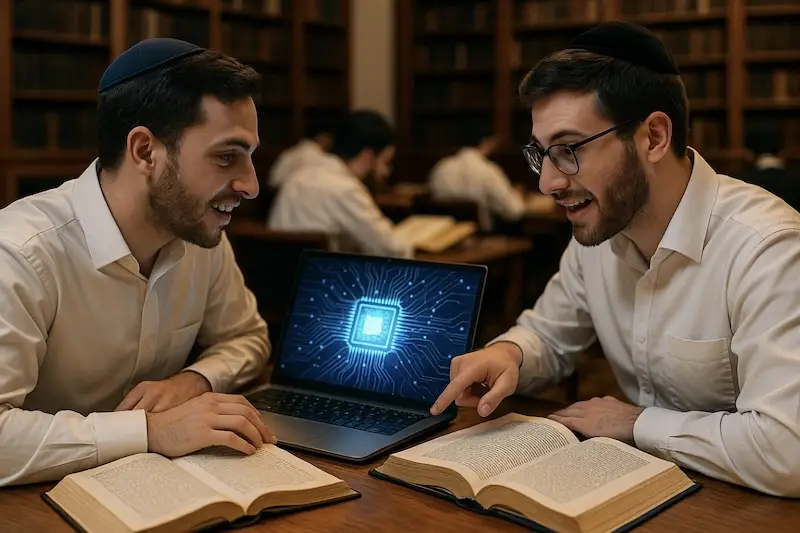Most people have the same reaction when they hear about AI and Torah in the same sentence:
“Come on. I’ve used ChatGPT, it makes stuff up.”
And they’re not wrong.
Anyone who’s tried using a general AI model to ask serious Torah questions has probably seen it go off the rails. It might invent sources, quote sefarim that don’t exist, or give answers that sound smooth, but aren’t grounded in any real mesorah. Even when it’s directionally correct, it’s rarely something you’d rely on. And certainly not something you’d bring to a chavrusa or a shiur.
So for many, the conclusion feels obvious:
AI can’t handle Torah. It just doesn’t work.
But here’s the thing most people don’t realize:
That behavior isn’t because AI can’t do better.
It’s because the models you’ve used weren’t built to do better.
Why ChatGPT (and Most AI) Gets Torah Wrong
ChatGPT and similar tools are built to do something very specific: respond fluently to almost anything. They’re trained to sound human, be helpful, and “guess” what kind of answer a person would expect next in a conversation.
That’s great for writing poems, emails, recipes, or coding help.
But it’s a real problem when it comes to Torah.
Why? Because these models aren’t trained to care about truth. They’re trained to sound plausible. They don’t know if a source is made up, they just know that “Rambam in Hilchos Teshuvah” sounds right in that spot. That’s why hallucinations happen. It’s not a glitch. It’s part of the design.
That’s also why almost everyone who’s tested AI on Torah questions walks away frustrated. And understandably skeptical.
But What If You Build AI Differently?
The truth is: this isn’t the only way to build AI.
There are newer, more advanced techniques that allow you to guide AI toward accuracy, structure, and even self-checking. You can design a system that doesn’t just “guess an answer,” but actually:
- Looks up real sources in real texts
- Cross-references itself in a loop
- Compares interpretations across commentaries
- Rejects weak responses and iterates
- Explains what it’s saying and why
In other words, you can build AI to behave like a careful learner, not a flashy writer.
But that only works if you actually design it that way. Most models out there aren’t built for that kind of work, because that’s not what they’re trying to do. They’re general-purpose tools. That’s why they fail in this setting.
But that doesn’t mean AI itself can’t be used for serious Torah learning. It just means you have to build something that’s actually meant for that.
This Is Why We’re Building ChatTorah
ChatTorah isn’t a skin on top of ChatGPT. It’s a new approach to AI one that’s purpose-built for Torah research, halachic exploration, and deep learning.
We’re using models that don’t just spit out answers, but search, compare, and cite. We’re training it with a level of care and precision that general tools simply don’t have. And we’re building layers of verification and transparency so that users know exactly where the information is coming from.
Will it be perfect? No. And we’re not pretending otherwise.
Even with the best tools, there will always be room for error. Torah learning is too rich, too complex, and too nuanced for any system, human or artificial,, to fully capture without careful study and guidance.
Which is why we want to be clear about something:
This Is Not a Replacement for Learning
ChatTorah is not here to replace your chavrusa, your sefarim, or your Rav.
It’s here to open access, spark discussion, and make sources easier to explore.
Too often, people are full of questions but don’t know where to start. Or they’re learning something and want to find other places it’s discussed. Or they’re preparing for a shiur and don’t have the time to manually flip through dozens of indexes.
This tool is meant to help with that. To bring the gates of Torah just a little closer. To let more people step in.
But the learning still has to happen. The sources still need to be read. The questions still need to be asked. The mesorah still needs to be respected.
We’re not here to close the book, we’re here to help you open it.
Why This Matters Now
AI is going to shape how people search, learn, and understand the world, whether we like it or not.
The question isn’t whether Torah will exist in that world. The question is whether it will be treated with the depth, seriousness, and integrity it deserves.
We believe it can be. But only if it’s built the right way.
Carefully. Thoughtfully. Respectfully.
And with people who know what’s at stake.
That’s why we’re building ChatTorah.
Not to end the conversation.
To finally help more people start one.

